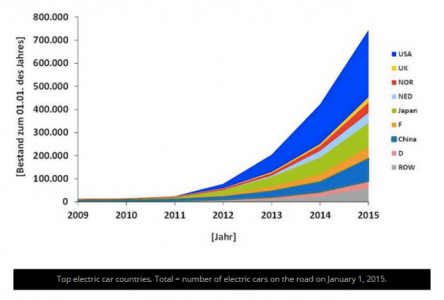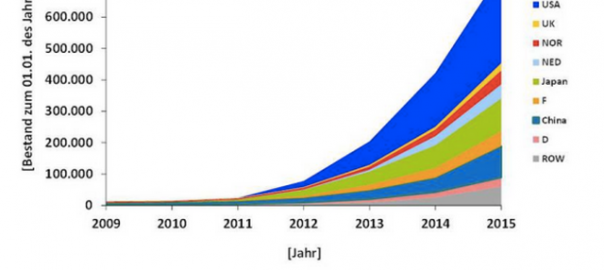Summary
- Petroleum has been the main transportation fuel for over a century, which has spawned one of the largest industries as a result.
- Despite petroleum’s pervasive influence on society, the energy industry may be changing irrevocably with the rapid electrification of transportation.
- The shift toward electric transport will likely happen faster than most anticipate given the inherent advantages of electric transport, leading to several investment opportunities in the electric industry.
For the last century or so, the energy industry has largely been segmented. While energy sources such as coal, natural gas, nuclear, and renewables have primarily been used for electricity generation, petroleum has mainly been used as a fuel for transportation. Ever since oil drilling technologies were invented in the mid-19th century, petroleum has become the superior choice for transportation. Petroleum has become so vital to the transportation industry that oil supermajors, i.e. Exxon (NYSE:XOM), BP (NYSE:BP), ConocoPhillips (NYSE:COP), etc, have become some of the most valuable corporations in the world.
While these corporations also have interests in other forms of energy such as natural gas, petroleum still consists of a huge portion of these companies’ business portfolios. Despite the increasing energy diversification of such firms, the influence that petroleum plays on these companies is undeniable. This is not surprising as the transportation industry is notoriously energy intensive. In fact, only the industrial sector beats out the transportation sector in terms of energy usage in the U.S., with the residential and commercial sectors coming in third and fourth. Overall, transportation accounts for nearly one-third of total energy consumption, making petroleum an incredibly important commodity.
An Inevitable Convergence
With the thousands of trillions of BTU’s used for transportation alone, petroleum has become a huge component of the energy industry. Despite petroleum’s historical and current importance, its relevance may soon be limited. With the rising trend of electric transportation, the transportation industry may start to converge with the rest of the energy industry in terms of fuel sources. As petroleum is not a competitive source of electricity generation in the majority of the world, petroleum may have an increasingly hard time maintaining relevance moving forward.
While this is nowhere near apparent given that the vast majority of transportation is still petroleum-based, a massive shift toward electrical transportation could happen much sooner than most expect. This, of course, would have detrimental effect on companies with heavy crude oil interests, such as the aforementioned supermajors like Exxon. On the other hand, the electrification of transportation will only increase the need for other electricity-based energy sources, raising the prospects of coal companies, natural gas companies, renewable companies, etc.
While the solar PV industry will likely be the biggest winner in the long-run for its own reasons, other electricity-based energy industry’s will also undoubtedly benefit. A paradigm shift towards electric transportation will essentially give traditional electricity-based energy companies a huge influx of demand. To put this into perspective, an average person uses more energy for transportation than for residential purposes. Needless to say, the electrification of transportation will drastically alter the energy landscape.
Signs Of A Transformation
Given that electricity based transportation, namely motor vehicles, have inherent advantages over ICE-based transportation (e.g. superior safety, superior design potential, less pollution, and less noise), the only real debate lies in how fast electric cars will decrease in price. The cost-effectiveness of energy storage technology has always been the major barrier in the mass adoption of electric cars. With Tesla’s (NASDAQ:TSLA) massive investment into energy storage technology, the biggest barrier to mass adoption of electric vehicles should all but disappear in the near/mid-term. This is not to say that Tesla is alone in this pursuit, as many other major corporations are starting to funnel money into electric transportation R&D.
While Tesla itself will likely have a limited direct impact on the electrification of the transportation industry, the rise of the company has catalyzed an industry-wide movement towards electric vehicles. With Tesla’s stunning success thus far, major automotive companies such as General Motors (NYSE:GM) are beginning to put previously unimaginable emphasis on the development of electric vehicles. By proving that electric transportation is not only viable, but a theoretically superior alternative to ICE-based vehicles, Tesla has drastically accelerated the trend towards electric transportation by reigniting interest in this arena.
Industry Shift Likely To Occur Much Sooner Than Expected
Currently, far less than 1% of all transportation is electricity-based, with approximately 800,000 highway-capable electric vehicles sold worldwide thus far. On top of this, only about half of this figure is from purely electric vehicles, as opposed to hybrids. Given this information, it seems ludicrous to assume that a mass transformation toward electric transportation is possible even within the next few decades. While this line of thinking is certainly justified without the context of growth potential and technological advancements, the reality is that the electric vehicle industry is still in its extremely early stages of development. This implies that the electric transportation industry as it currently stands is nowhere near its potential.
The fact is that electric vehicle demand has been dramatically ramping up over the past few years, with the global electric vehicle market growing by approximately 76% in 2014. In addition, growth only seems to be accelerating, which is not surprising given the surge in electric vehicle popularity. What makes this growth even more amazing is that electric vehicles are still not yet cost-effective with ICE vehicles, implying that the inherent advantages of electric vehicles are powerful enough to overcome a severe cost disadvantage in the eyes of consumers. With the acceleration of electric vehicle innovation (mainly in the battery arena), even cost should no longer be a barrier a decade or so down the road.
Given the current roadmap of electric vehicle technological improvements, electric vehicles should easily become cost-comparable to ICE vehicles in a 5-10 year timeframe. In fact, Tesla is slated to unveil a $35,000 electric vehicle with at least 200 miles of range in approximately one years time, showcasing the speed at which electric vehicle technology is improving at. Given all the advantages that electric vehicles hold over ICE vehicles, growth will likely explode once the average price point of electric vehicles reach parity with those of ICE vehicles. While there will still be a huge fleet of petroleum consuming vehicles that will take decades to get rid of, a large-scale electrification of transportation seems inevitable in the mid/long-term. This, of course, will have huge implications on a number of industries, notably the crude oil industry.

Massive Industry Impact
The mass electrification of transportation will have an enormous and irrevocable impact on several major energy industries as was mentioned before. The petroleum industry will likely be severely crippled as a result of the transportation industry’s shift away from oil. Electricity-based energy industries, i.e. coal, natural gas, nuclear, wind, and especially solar PV, will end up taking in the energy demand of the transportation industry. This implies that at current valuations, oil companies are overvalued while the general electric industry is undervalued. While there is certainly a debate about which type of electricity-based energy source will get most of the benefits in the long run, be it coal, natural gas, solar PV, wind, etc, there is no doubt that the electricity industry as a whole will benefit.
Conclusion
The electrification of transportation may be one of the most impactful transitions in modern day history. Not only will it drastically alter the landscape of the energy industry, but it should also have enormous geopolitical ramifications (think the Middle East). Supermajors like Exxon, Chevron (NYSE:CVX), or any petroleum-based company for that matter will be severely negatively effected by this likely transition. At current, companies will a heavy focus on petroleum are valuated as if oil will make up for the vast majority of transportation fuels for the long-term future (with P/E ratios in the range of 10-20).
This is far from a foregone conclusion given the exploding popularity and inherent advantages of electric transportation. Given the nascent stage of electric transportation, it makes for an opportune time to sell oil holding. Many find it absurd to think that transportation will make a such a large transition in a decade or so, which is completely understandable given the huge and unchanging influence petroleum has played in transportation for over a century. Despite this, only a few basic assumptions about technological progress need to be made in order to take on the thesis that transportation will primarily become electricity-based much sooner than most expect.
Source: Seeking Alpha
